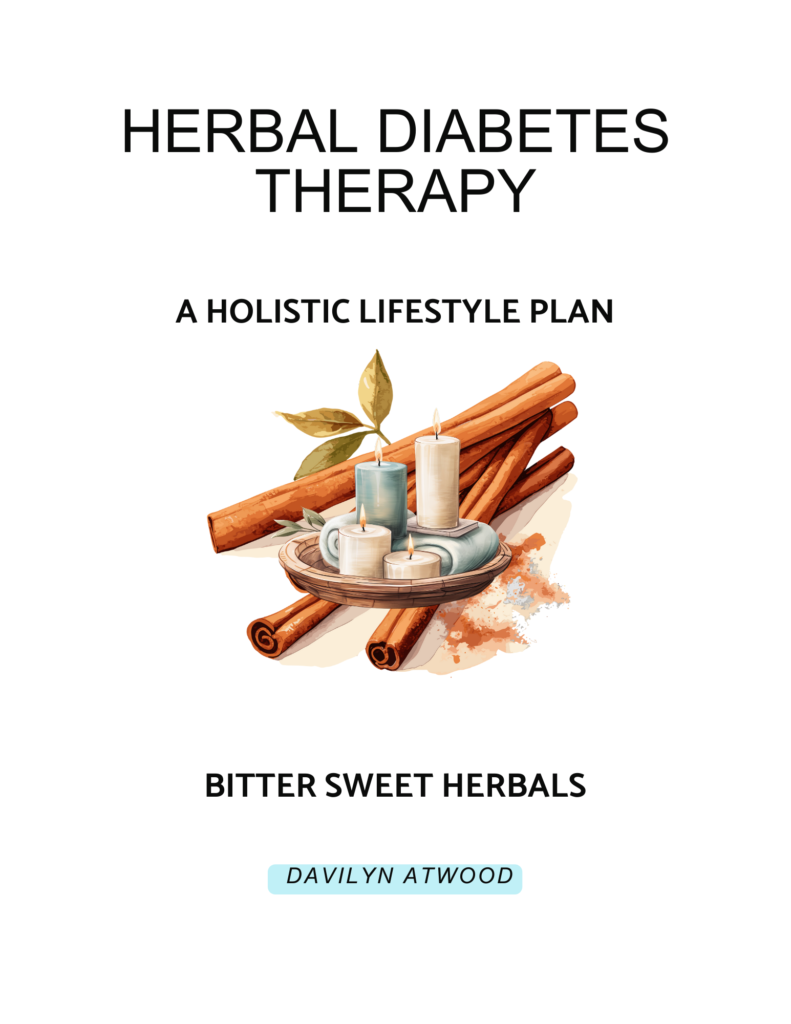Create a Personalized Herbal Plan: Integrating Herbs into Your Daily Routine
Once you have selected the right herbs for your specific health needs, the next step is to create a personalized herbal plan that fits seamlessly into your daily life. This plan should be designed around your lifestyle, preferences, and health goals, ensuring that herbal remedies are easy to integrate and effective in supporting your well-being. By choosing the right formulations and dosage, you can maximize the benefits of herbs in a way that feels natural and sustainable.
Formulations: Choosing the Right Herbal Format for Your Needs
Herbs come in a variety of forms, each with its own benefits, convenience, and method of delivery. Choosing the right formulation for your daily plan depends on your lifestyle, the type of herbs you’re using, and the desired effect.
Teas: Gentle and Soothing Support

Herbal teas are one of the most traditional and soothing ways to incorporate herbs into your routine. They offer a gentle and ongoing method of support, ideal for herbs that are safe for daily use over extended periods. Teas are particularly effective for nervines and digestive herbs, as sipping a warm tea can provide immediate comfort while also delivering the medicinal compounds of the herbs.
Example Use: If your goal is to manage stress, a cup of chamomile or lemon balm tea in the evening can calm your nervous system, helping you unwind before bed. Similarly, a peppermint or ginger tea after meals can stimulate digestion and relieve bloating.
Benefits: Teas are hydrating, easy to make, and offer a simple way to introduce herbs into your daily life. They can also become a calming ritual that promotes mindfulness and relaxation.
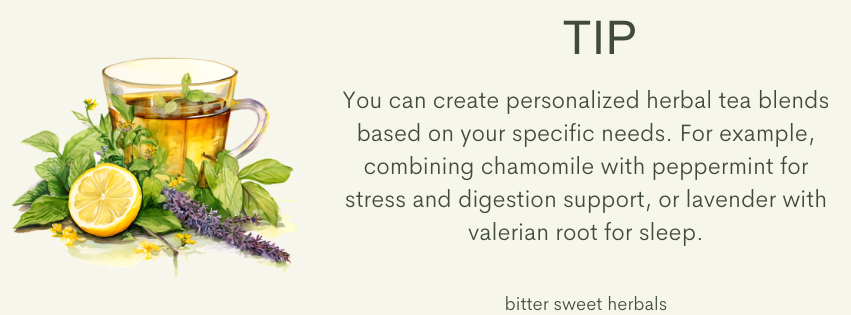
Tip: You can create personalized herbal tea blends based on your specific needs. For example, combining chamomile with peppermint for stress and digestion support, or lavender with valerian root for sleep.
Tinctures: Concentrated and Convenient
If you’re looking for a more concentrated form of herbs, tinctures are an excellent choice. Tinctures are made by extracting the active compounds of herbs into alcohol or glycerin, making them potent and fast-acting. They are especially useful for adaptogens or bitter herbs that may be too strong or unpalatable in tea form.
Example Use: For those managing chronic stress, a few drops of ashwagandha tincture under the tongue or in a small amount of water can provide sustained support throughout the day. If you need digestive support before meals, bitters tinctures (like gentian or dandelion root) can stimulate digestion and improve nutrient absorption.
Benefits: Tinctures are versatile, easy to take on the go, and provide a quick way to get concentrated doses of herbs. They’re perfect for busy lifestyles or when you need a stronger intervention.
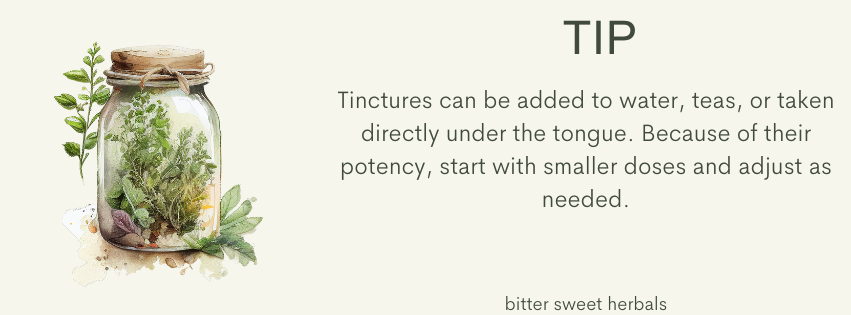
Tip: Tinctures can be added to water, teas, or taken directly under the tongue. Because of their potency, start with smaller doses and adjust as needed.
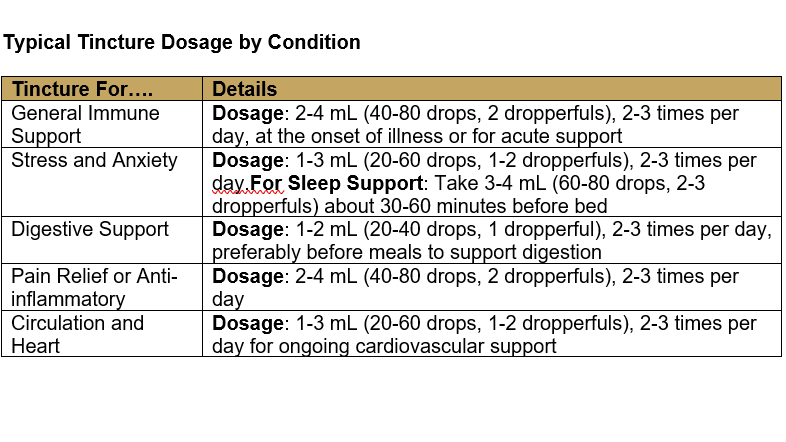
Capsules/Tablets: Precision and Convenience
For those who prefer precise dosing, capsules and tablets offer a convenient option. These forms are particularly useful for herbs that are difficult to take in other forms, such as adaptogens or herbs with a strong taste. Capsules are also great for travelers or those with busy schedules who need a quick, standardized way to take their herbs.
Example Use: If you’re using turmeric for its anti-inflammatory benefits, taking it in capsule form ensures you get a standardized dose of the active compound, curcumin. Similarly, ashwagandha capsules can provide daily support for managing stress without the need for preparation.
Benefits: Capsules and tablets are easy to take and provide precise dosing. They are particularly useful when you need consistency in dosage, such as when using adaptogens or immune-supporting herbs.
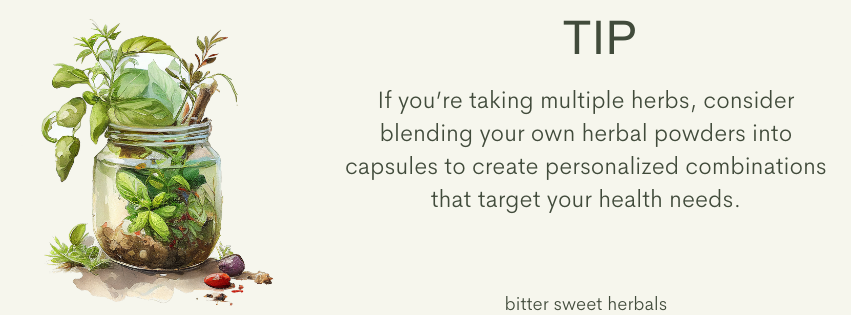
Tip: If you’re taking multiple herbs, consider blending your own herbal powders into capsules to create personalized combinations that target your health needs.
Extracts: Highly Concentrated and Potent
Herbal extracts offer the highest concentration of active compounds and are often used when a strong intervention is needed. These extracts are made by removing all non-medicinal parts of the herb, leaving behind only the potent medicinal components. They can be taken in small amounts while still delivering a powerful effect.
Example Use: For someone dealing with acute inflammation, a turmeric extract might be used in smaller, more concentrated doses than capsules or powders. Similarly, an echinacea extract could be taken at the first signs of a cold to boost the immune system quickly.
Benefits: Extracts offer a powerful dose in a small, easily absorbable form. They are especially beneficial for addressing more severe or acute health concerns.
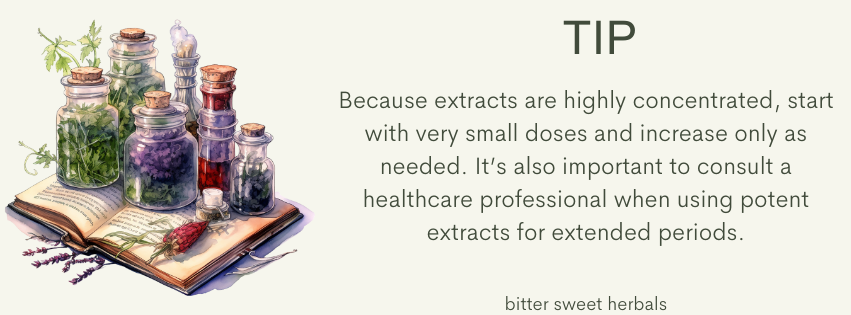
Tip: Because extracts are highly concentrated, start with very small doses and increase only as needed. It’s also important to consult a healthcare professional when using potent extracts for extended periods.
Dosage and Frequency: Finding the Right Balance for Your Body
Once you’ve chosen your preferred formulation, the next step is to determine the appropriate dosage and frequency for taking your herbs. Finding the right balance ensures that you get the most benefit without overloading your system. Here’s how to approach dosing:
Start Slowly
Herbs are gentle yet powerful, and it’s essential to start with lower doses to see how your body responds. Even though herbs are natural, they can still have strong effects, and everyone’s body reacts differently to them.
How to Start: Begin with the lowest recommended dose for the herb you’re using. For example, if you’re taking a tincture, start with 10-15 drops instead of the full 30-drop dose. If you’re drinking tea, start with one cup per day rather than two or three.
Monitor Your Body: Pay attention to how your body feels after taking the herb. Do you feel better, more energized, or more relaxed? Or do you notice any side effects like digestive upset or fatigue? Gradually increase the dose if needed, but always listen to your body’s signals.
Follow Recommendations
It’s important to adhere to dosage guidelines provided on herbal labels or from your herbalist. The recommended dosage can vary depending on the herb, your body weight, age, and the specific condition you are addressing.
- Consult an Herbalist: If you’re unsure of the correct dosage, working with a qualified herbalist can provide personalized guidance. They can help you determine the best dosage for your body and the herbs you are using, as well as how to adjust over time based on your progress.
- Be Aware of Potency: Some herbs are more potent than others and require lower doses, while others (like adaptogens) may require consistent, higher doses for long-term support. Always double-check the strength of the herb you’re taking, especially with tinctures and extracts, which are more concentrated.
Consistency is Key
For the best results, herbs should be taken consistently over time. Unlike pharmaceutical drugs, which can have an immediate effect, herbs often work gradually by nourishing and supporting the body’s systems. The more consistently you use them, the more profound and long-lasting the results.
Create a Routine: Incorporate herbs into your daily routine at the same time each day to establish consistency. For example, you might drink a cup of ginger tea every morning, take a turmeric capsule after lunch, and use an ashwagandha tincture before bed. Building these habits ensures that the herbs have the opportunity to work cumulatively in your body.
Track Your Progress: Keeping a journal of your herbal intake, along with any changes in how you feel, can help you track the effectiveness of your plan. It can also provide insights into whether you need to adjust dosages or try different formulations.

Creating a personalized herbal plan that aligns with your lifestyle and health goals is an empowering way to take control of your well-being. By selecting the right formulations and determining appropriate dosages and frequency, you can integrate herbs seamlessly into your daily life. Whether you prefer the gentle ritual of herbal teas or the potency of tinctures and extracts, consistency and mindfulness in your approach will help you achieve the best results. Remember to start slowly, listen to your body, and adjust as needed to find the perfect balance that supports your long-term health.
My Approach To Using Herbal Therapies for Health Part 1
Creating a Personalized Herbal Therapy Plan Part 2
Fine Tuning Your Herbal Plan for Optimum Results Part 3
Creating a Holistic Approach to Healing – Part 4
Educate Yourself Continuously: The Key to Empowered Herbal Healing Part 5
A Structured Approach to Daily Wellness – Part 6 – Conclusion

